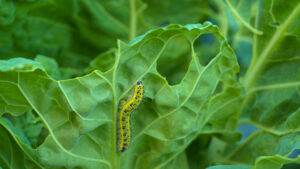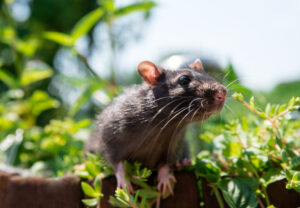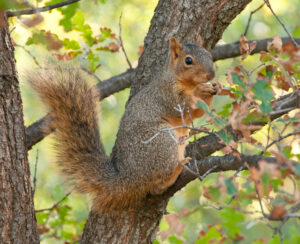Instead of “lions, tigers and bears, oh my!”, this refrain may sound more like “aphids, cutworms and slugs – oh no!” or “rats, squirrels and rabbits – oh dear!” when it comes to your garden. Unfortunately, these six critters are only some of the pests you have to figure out how to keep out of your garden. For those looking to start a garden for the first time to garden lovers with a green thumb, finding ways to keep critters out of the garden is a rite of passage. To help, the following outlines the main types of critters that invade gardens and some simple steps to reduce the risk. For pest prevention recommendations, wildlife control and other critter removal solutions, it may be worthwhile to work with a local pest control specialist, like Eliminate ‘Em to help!
How to Keep Critters Out of the Garden

For first-time gardeners and veteran growers alike, figuring out how to keep critters out of the garden is an ongoing and time-consuming challenge. It also requires a certain degree of acceptance, since an entire growing season is unlikely to pass without a single pest incident. The following explores why bugs and animals alike come to your garden, warning signs of their presence, and general protective measures.
Why are there so many critters in the garden?
Everything from watering to compost use to crop or flower selection may make your garden an ideal living location for one pest or another. However, understanding why your garden attracts so much interest from various critters helps inform how you can keep them out of your garden. There are three main reasons why your garden may be a preferred living destination or daily activity hub for a variety of critters:
- Food: The new stalks of emerging peas and tomato plants can be chewed through by cutworms or enjoyed by rabbits. Birds may be interested in the helpful worms or the blackberries that fall off of your bushes. Other intruders may be in your garden to prey on other pests instead of what you’ve put in the garden, though they may still damage some plants or flowers while they are hunting. To keep your sanity (and continue to enjoy gardening), remember that limiting pest impact and presence in your garden is a more feasible goal than trying to entirely eliminate any possible food sources.
- Moisture: Critters are also in your garden for this other survival essential. Clearly, your plants require water to grow. However, heavy periods of rain or regular overwatering may result in unwanted pest infestations, like mosquitoes, as well as plant problems including root decay and fungal issues as shared by the Missouri Botanical Garden. However, moisture (or standing water) can offer some advantages. For example, some gardeners incorporate bird baths into their garden areas to help with insect control or bee baths to support bees and pollination, as explained by SavetheBee.org. To reduce issues that may come with standing water, empty and refill these bowls regularly.
- Shelter and Nesting Spots: Those warm and sunny spots, the moist and cool ones beneath accumulated leaves and other garden debris, or even just the underside of a kale leaf may become home to one or more critters. Any covering offered by features like tomato plant foliage or closely planted heads of lettuce may also provide excellent hiding spots when predators like hawks or cats are nearby.
What signs suggest that critters in the garden are becoming a problem?
Gardens attract a variety of critters – both beneficial and harmful because they provide food and preferable environments. Being able to recognize signs of animal and insect damage can help you begin the problem-solving process in your garden. In addition to red flags like bunnies hopping around in your lettuce, here are 8 indicators that may tell you it’s time to figure out how to keep critters out of the garden:
- Tracks or feces
- Nests
- Dirt in containers or beds that has been dug up
- Missing plants or broken plant stems
- Bite marks on ripe tomatoes or other produce
- Displaced or partially chewed bulbs
- Gnaw marks on the garden structure or its contents
- Holes in the leaves or leaf discoloration
What are some general tips for how to keep critters out of the garden?
The kinds of critters you have to learn how to keep out of the garden may vary by location, climate and what you are growing, as well as your garden design and practices. Remember: pest populations can also fluctuate by year, and effective control and repellent strategies may need to be adjusted accordingly. However, this list of tips can help you in your effort to keep those critters out!
- Leverage your garden planning efforts. As the EPA highlights, strategies like crop rotation and choosing pest-resistant plant varieties can help deter certain intruders, especially those that are specifically attracted to certain crops. If you haven’t tried this approach to your garden before, the Almanac provides a helpful guide to Crop Rotation 101 for vegetable gardens. You might also try companion planting with herbs, vegetables, and flowers to help ward off pests. For more, the Farmer’s Almanac provides tips for the 10 most popular vegetables, such as carrots and lettuce.
- Welcome beneficial insects. In discussing how to keep critters out of the garden, welcoming some of them into the garden may seem contradictory. However, much like including a bird bath in your garden area encourages these critters to make meals of some less preferable pests, encouraging ladybugs can also be a helpful choice. Ladybugs consume aphids, thrips, mites, and white flies. Additionally, the home and garden experts at HGTV note that additions like calendula and nasturtium flowers, as well as chives and cilantro, attract helpful ladybugs. While some gardeners choose to purchase extra ladybugs to release in this pest control effort, be careful to incorporate the correct native ladybug because if this species isn’t chosen, this option may cause new issues in the garden and elsewhere.
- Connect with your local Cooperative Extension. If you are looking to learn more about gardening in your area or want personalized recommendations specific to your garden needs, take advantage of this resource! For example, the University of Rhode Island’s Cooperative Extension has a free Gardening and Environmental Hotline that lets you connect with Master Gardeners by phone, email or in person. They also offer free soil pH testing. The results of this test can not only optimize your garden beds for planting but also help you determine the cause of any plant problems. In some cases, soil issues and pest presence can have similar signs. GardeningKnowHow shares more about these services and how to find them in your area!
- Use fencing as well as fabric or mesh coverings. A thoughtfully constructed fence geared toward preventing the specific intruders that frequent your garden can be another meaningful investment in pest prevention. Although a fence may not keep many insects out, the correct garden fence may help deter local outdoor cats, opossums, rabbits and other animals by leveraging high fencing and side-by-side fence panels or a combination of posts mixed with small wire mesh. Similarly, employing bird netting, fabric row covers and mesh cages can thwart smaller critters as well as some insects from getting to the plants, depending on the tightness of the weave and the security of the installation.
Strategies to Keep Common Pests Out of the Garden
Knowing what attracts animals and insects, as well as the signs of their damage, is helpful in identifying, preventing, and addressing their presence in your garden. In addition to general strategies for how to keep critters and pests out of a garden, the following offers some additional methods for deterring common bugs, rats and mice, and other pesky rodents below.
How to keep bugs out of the garden?
Encountering insects in the garden is expected, but having bugs fly in your face while you are working or eating your carefully cultivated flowers and veggies is both irksome and disheartening. Pesticides are one option, but many people opt to try natural methods first. Check out some of these approaches for the following common garden bugs.

- Aphids: According to the University of Maine’s Cooperative Extension, simply using your garden hose can quickly dislodge and kill most aphids. Spraying with a soapy mix can further ensure their demise. Take action as soon as you see any aphids because they can travel and reproduce quickly!
- Mosquitoes: In terms of your flowers and other plants, mosquitoes can actually be beneficial in the garden. However, they are incredibly bothersome to gardeners. Although you can’t keep bugs like mosquitoes out of the garden entirely, knowing how to limit their presence is helpful. In addition to citronella or other deterrent sprays on your person, regularly empty and refill any birdbaths. Additionally, try to prevent standing water spots in the garden, and be sure to clean or refresh other nearby water sources, like pools, routinely. Finally, don’t forget to include some of the flowers and herbs that help keep this pest and others away, such as basil and marigolds.
- Cutworms: One strategy to help prevent plants from being damaged by cutworms is to put a cardboard collar around them during the planting process. This is also a great way to reuse emptied toilet paper or paper towel rolls. Some people even start seeds directly in the roll, so that they can just transfer them to the garden. Ensure that a few inches of cardboard barrier surrounds the plant both above and below ground. The University of Minnesota Extension provides additional identification and monitoring guidance if you are experiencing cutworm concerns.
- Cabbage worms and flies: Like the various flies that may appear at family picnics and other outdoor events, these bugs happily go after your food, just in a different form. From roots to leaves, they can damage plants like cabbage, broccoli, and kale, but they’ll eat other things too. According to the Almanac, you can remove and destroy any eggs you find under the leaves and along the stems, and neem oil can be another effective solution if you are thinking about how to keep this bug and others out of your garden.
- Earwigs: A nuisance found both inside and outside of the home, earwigs will enjoy decomposing flowers, vegetables, and fruit as well as new buds, leaves, and other plant parts. So, your compost pile or mulch may be of interest to them as much as the garden itself. According to the Utah State University Extension, dropping any earwigs you run across into soapy water will do away with them. These bugs can also be trapped using cardboard or plastic containers (like yogurt) that have bait in them and then disposed of. If you find them in your home, exclusion and sealing services or other treatments may be needed from the professional pest control team near you.
How to keep rats and mice out of the garden?
Dangerous diseases, car damage, and garden destruction are only some of the ways that rats and mice can plague gardeners. Since these small creatures easily slip through many fencing options and dig under barrier structures, figuring out how to keep rats, mice, and other rodents out of a garden can be quite a task. Aside from professional rat and mice removal or extermination, these methods may help reduce the potential that these pests will continue to wreak havoc in your garden:

- Consider adding or upgrading your fence to include wire mesh. Rats can chew through a lot. However, stainless steel mesh with holes of about two millimeters prevents this possibility and the chance that they can slip through it. As a bonus, it will help keep a variety of other critters out as well!
- Let that local outdoor cat stroll through your yard or rescue one yourself to protect your yard and gardens! A caution: if your garden isn’t fenced, a cat may use it as a bathroom or do some digging, which may have the opposite impact from the one you intended.
- Do some cleanup! Rats and mice may see any fallen leaves that have accumulated around the side of a raised bed or piles of grass clippings, branches, and other yard items as nesting opportunities. Reducing attractive shelter and nesting areas will help limit the potential for these pests to move in and, worse, have babies that will also enjoy your garden goodies.
How to keep other rodents including squirrels, gophers and woodchucks out of the garden?
Like bugs, rodents will damage plants in various stages of growth. The structural damage that they can cause by gnawing may also interfere with other protective measures like fabric netting or even the beds themselves. Find some recommendations for how to keep rodents out of the garden below.

- How can I keep squirrels out of the garden? While you may prefer that squirrels raid your garden instead of infiltrating your attic or garage, don’t give up all of your hard work without a fight! Fencing can help protect your garden, but squirrels may be able to hop up and over it depending on its size and construction or launch themselves into a garden from a nearby tree or bush. So, what’s a gardener to do? Go-to growing supplier, Bonnie Plants, suggests plant cages (available for more than just tomatoes) and scare tactics, such as surprising them with sprinklers or startling them with the light and movement from shiny objects like old aluminum tins and CDs. The odor from hot peppers in powder or spray form is also disliked by squirrels.
- How can I keep gophers and woodchucks out of the garden? Both gophers and woodchucks love to dig. If you find holes in the soil around your plants or underneath the perimeter of a raised bed or fencing, you may need to determine how to keep these rodents out of your garden. Extending the wire mesh fencing below ground is one option. If lavender, rosemary, and other pest-repelling plants haven’t yet made your planting list, adding these options in and around your garden can help discourage gophers. Aside from professional woodchuck relocation, HGTV recommends the use of pet fur from a recent brushing of your dog or kitty litter to deter them. Employing as many prevention measures as possible is essential since gophers and groundhogs (aka woodchucks) together can destroy plants from their roots to their fruits.
Feeling fatigued by the prospect of battling critters to keep your garden safe again this year? Eliminate ‘Em can help you figure out how to protect your garden and your home from bugs, rats and other rodents, and more! Contact us today to learn more.


